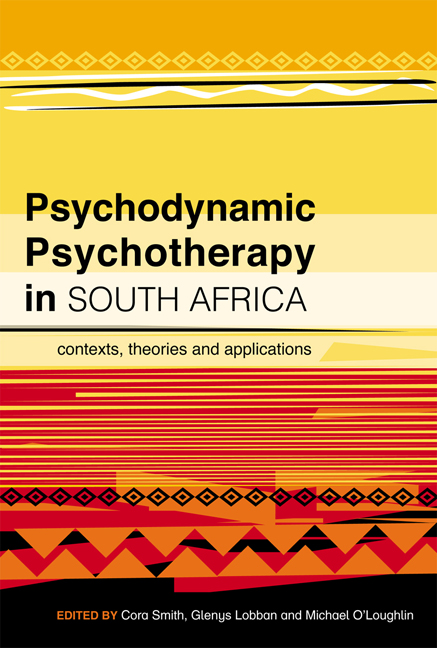Book contents
- Frontmatter
- Contents
- Editors
- Contributors
- Acknowledgements
- Acronyms
- Introduction Cora Smith
- Section I Subjectivity and identity
- Chapter 1 Naming and otherness: South African intersubjective psychoanalytic psychotherapy and the negotiation of racialised histories
- Chapter 2 Raising the colour bar: Exploring issues of race, racism and racialised identities in the South African therapeutic context
- Chapter 3 Subjectivity and identity in South Africa today
- Section II Traumatic stress
- Section III Social issues
- Afterword Glenys Lobban and Michael O'Loughlin
- Index
Chapter 1 - Naming and otherness: South African intersubjective psychoanalytic psychotherapy and the negotiation of racialised histories
from Section I - Subjectivity and identity
Published online by Cambridge University Press: 21 April 2018
- Frontmatter
- Contents
- Editors
- Contributors
- Acknowledgements
- Acronyms
- Introduction Cora Smith
- Section I Subjectivity and identity
- Chapter 1 Naming and otherness: South African intersubjective psychoanalytic psychotherapy and the negotiation of racialised histories
- Chapter 2 Raising the colour bar: Exploring issues of race, racism and racialised identities in the South African therapeutic context
- Chapter 3 Subjectivity and identity in South Africa today
- Section II Traumatic stress
- Section III Social issues
- Afterword Glenys Lobban and Michael O'Loughlin
- Index
Summary
Why are encounters across difference often so complicated and prone to misunderstanding and painful experience of shame and exclusion? And why, worldwide, is there such violent acting out around difference – persecution of Jews, Christian crusades against Islam, genocide of one tribe by another in Rwanda? Being other, democrat or dictator, Muslim or Christian, poor or rich, black or white, living in the northern or southern hemisphere, gay or straight, married or single, man, woman or child, HIV+ or dying of starvation or healthy, the differences between us proliferate and continue to be marked in public discourse, named, every second, on all public media, and also privately, in our hearts and bones. In the decade since 9/11, notions of justice, national safety and retribution constantly rehearse an us–them divide. Genocides and the use of rape of women and children as a weapon of war erode daily our capacity to believe in a shared humanity, an underlying sameness between us all.
Given this extraordinary world context, it is not remarkable that there has been increasing concern about the ways in which psychoanalytic theory and practice might have been blind to, or perpetuated, prejudice in different ways. Theorising gender and sexuality, race and class, cultural difference and religious or spiritual values in the psychoanalytic space is no longer seen as an ‘extra’ set of variables to be taken into account, but as fundamental to the dialogue with the unconscious. The intersubjective and relational turn in psychoanalysis, embedded as it is in postmodern concepts of fluid and shifting identities, underwritten by powerful social systems, has been helpful in sharpening the focus on identity and difference and their effects on relational transformation. Within the psychoanalytic community broadly, there is a deepening movement towards political engagement (Benjamin, 2009). This involves a number of possible activities, ranging from pro bono consultation in public clinics, support for frontline activists working with disadvantaged and vulnerable groups, and engagement with psychoanalytic theory to ensure that it opens doors and embraces complexity, to taking a public stand against discrimination and the silencing of the disenfranchised, wherever it happens.
- Type
- Chapter
- Information
- Psychodynamic Psychotherapy in South Africacontexts, theories and applications, pp. 13 - 30Publisher: Wits University PressPrint publication year: 2013

